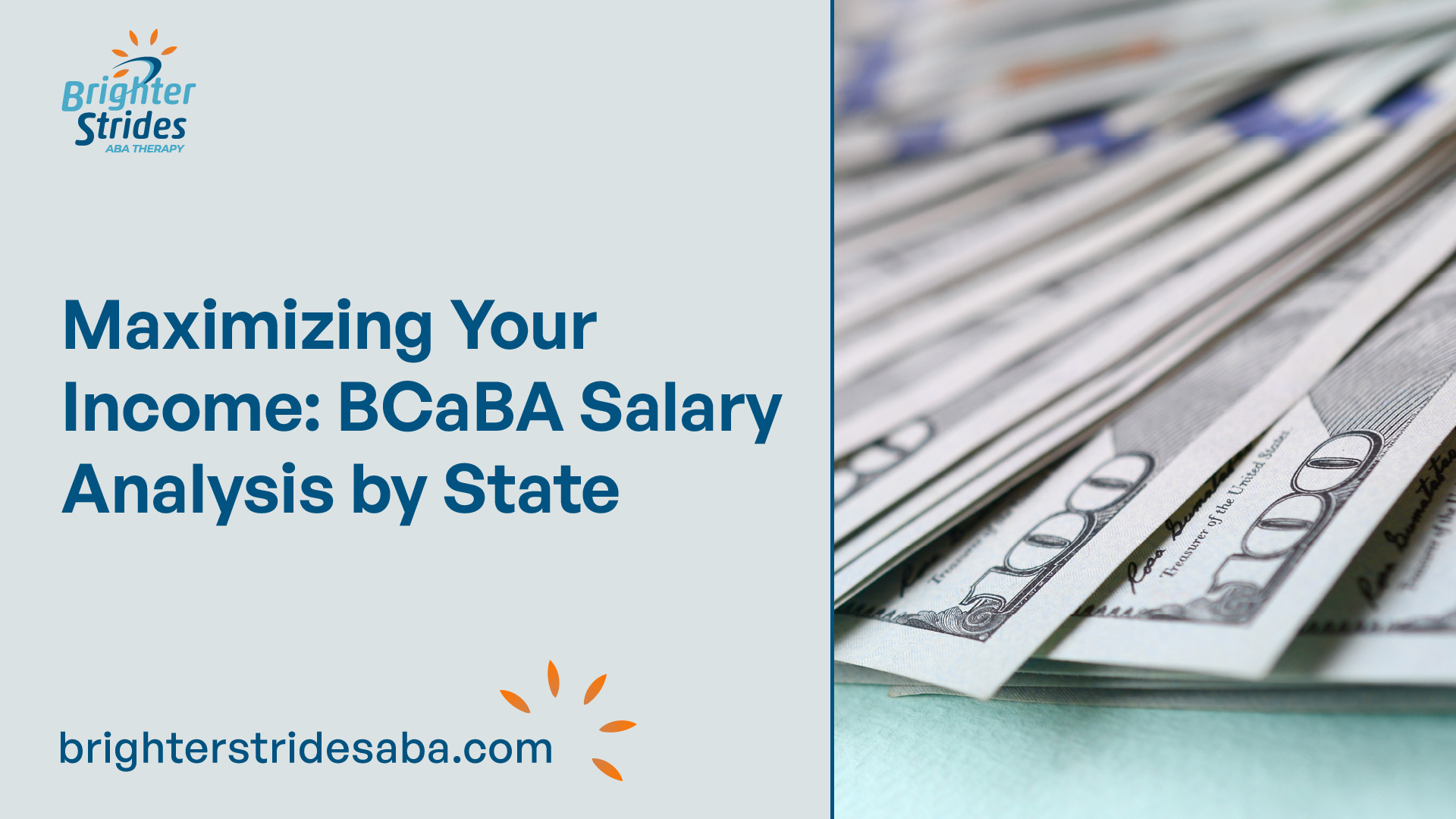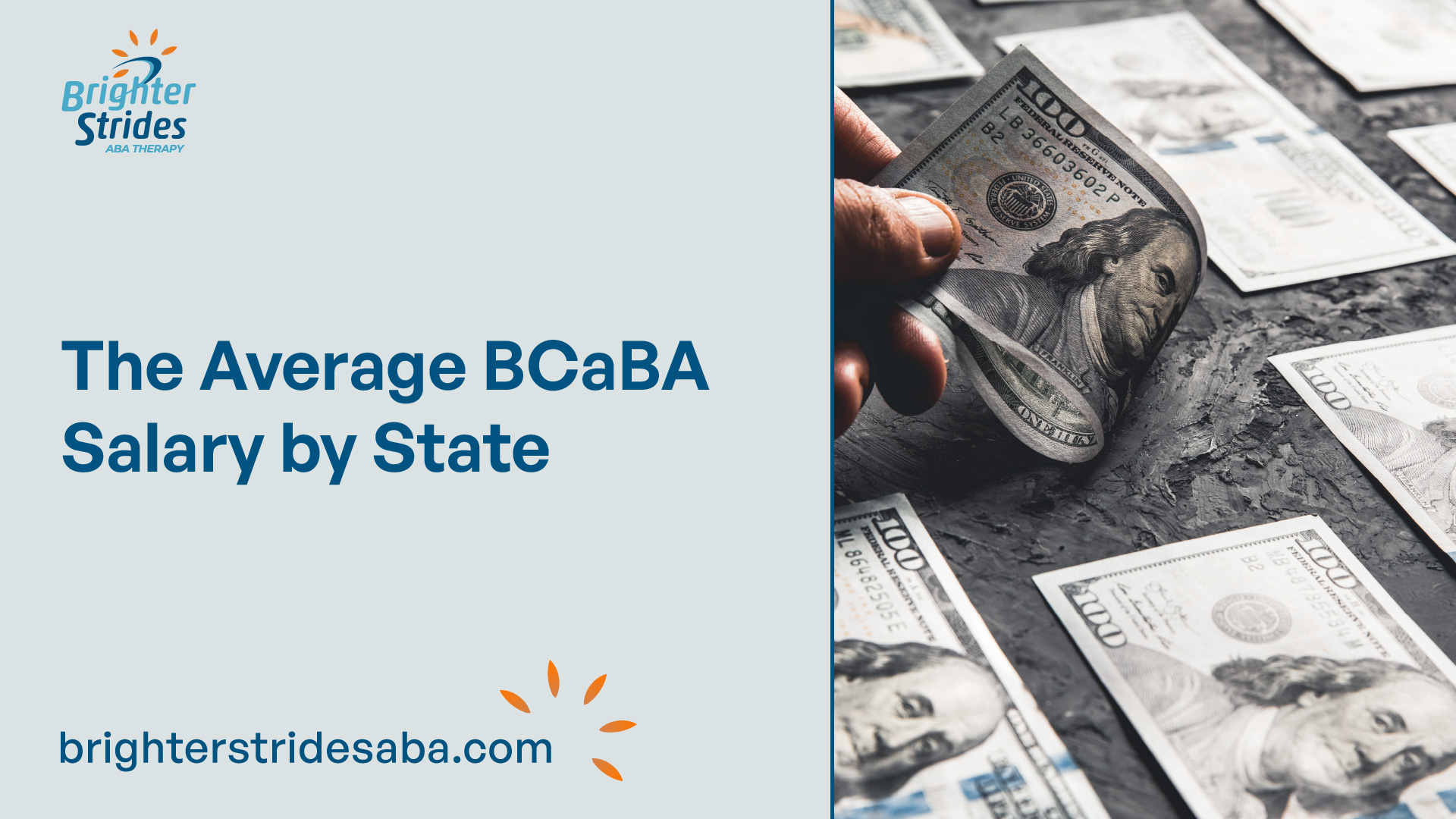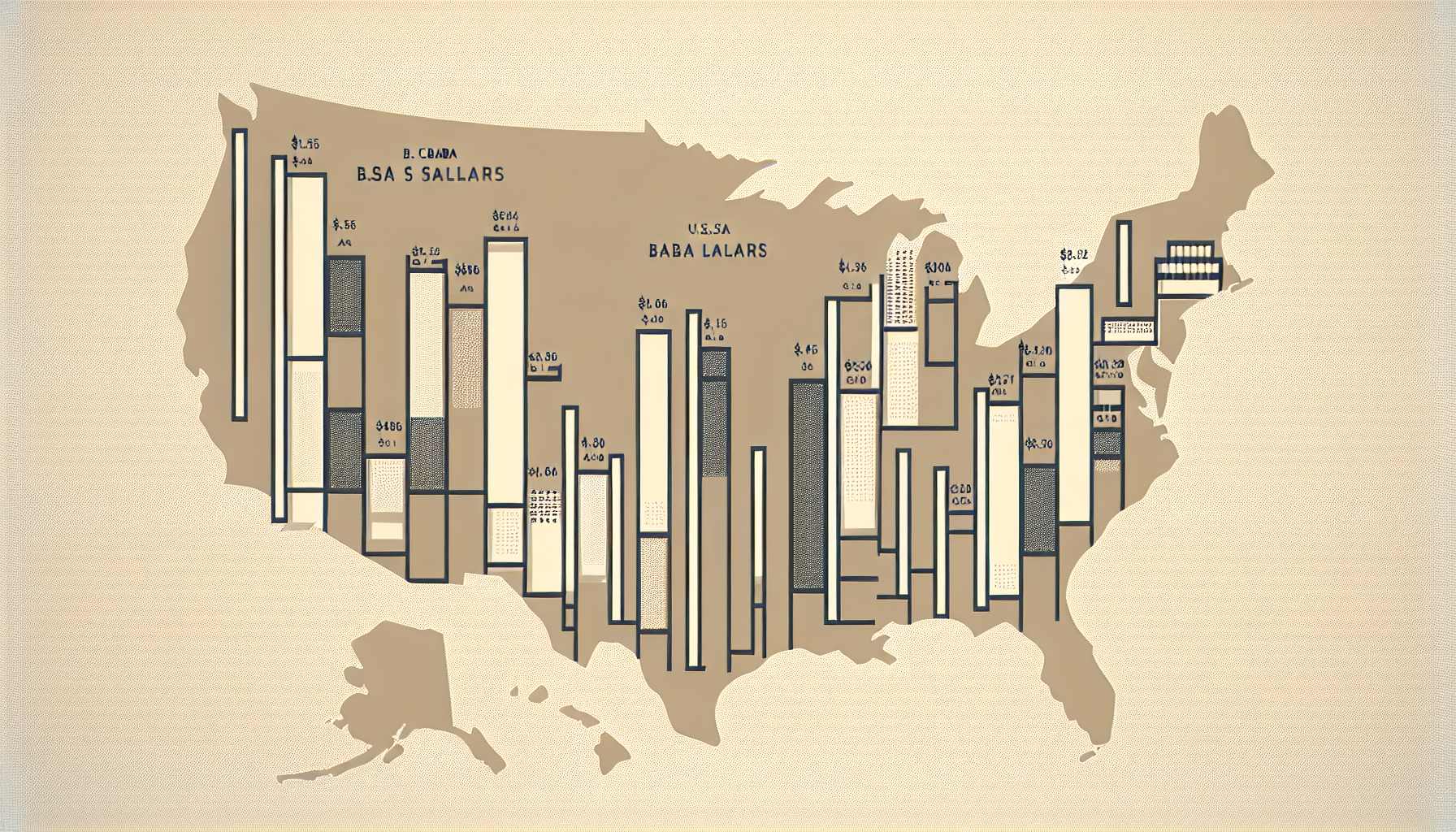
The Average BCaBA Salary by State
Understanding the average salary for Board Certified Assistant Behavior Analysts (BCaBAs) across different states is crucial for professionals in this field. In this section, we will provide an overview of BCaBA salaries and explore the factors that influence these salaries.
Overview of BCaBA Salaries
The average salary for a BCaBA in the United States is approximately $52,000 per year. However, it’s important to note that BCaBA salaries can vary significantly across states. According to data from 2021, the average annual salary for a BCaBA in the United States was $55,402.
The variation in BCaBA salaries is influenced by factors such as the demand for behavior analysts, cost of living, state regulations, and funding for applied behavior analysis services. These factors can contribute to the differences in salaries observed between states.
Factors Influencing BCaBA Salaries
Several factors contribute to the variation in BCaBA salaries across states:
- Demand for Behavior Analysts: States with a higher demand for behavior analysts often offer higher salaries to attract and retain qualified professionals. The demand can be driven by factors such as population size, prevalence of autism spectrum disorders, and availability of behavior analysis services.
- Cost of Living: The cost of living in a particular state can impact BCaBA salaries. States with a higher cost of living may offer higher salaries to compensate for the increased expenses associated with housing, transportation, and other necessities.
- State Regulations: Each state may have its own regulations and requirements for behavior analysts, which can influence salary ranges. Some states may have more stringent licensing or certification requirements, which could contribute to higher salaries.
- Funding for Applied Behavior Analysis Services: The availability and extent of funding for applied behavior analysis services can impact BCaBA salaries. States with robust funding for these services may have the resources to offer higher salaries to behavior analysts.
It’s important for BCaBAs to consider these factors when evaluating job opportunities and potential salary offers. Additionally, it’s worth noting that salaries can change over time as the field of applied behavior analysis continues to evolve.
Understanding the average BCaBA salary by state provides valuable insights for professionals in this field. It allows them to make informed decisions about career opportunities and provides a benchmark for salary negotiations. However, it’s essential to consider factors beyond salary alone, such as professional growth opportunities and job satisfaction, when choosing a career path in applied behavior analysis.

States with High BCaBA Salaries
When it comes to BCaBA salaries, certain states stand out for offering higher compensation to professionals in this field. Let’s explore some of the states with high BCaBA salaries: Maryland, New York, Hawaii, New Jersey, and Connecticut.
Maryland
Maryland takes the lead when it comes to BCaBA salaries. According to ZipRecruiter, the average salary for a BCaBA in Maryland is $71,150 per year. This places Maryland at the top, offering the highest BCaBA salaries in the country.
New York
New York is another state known for its competitive BCaBA salaries. In 2021, BCaBAs in New York earned an average annual salary of $68,145, as reported by Applied Behavior Analysis Edu. With its vibrant job market and higher living expenses, New York compensates BCaBAs at a level that reflects the state’s economic landscape.
Hawaii
BCaBAs in Hawaii can expect attractive compensation for their expertise. The average annual salary for BCaBAs in Hawaii ranges from $60,000 to $65,000, depending on the specific location within the state. The beautiful islands of Hawaii offer not only a unique lifestyle but also competitive salaries for BCaBAs, as reported by Applied Behavior Analysis Edu.
New Jersey
New Jersey is known for its strong commitment to professional development and higher education. It also offers competitive BCaBA salaries. BCaBAs in New Jersey earn an average annual salary of $60,000, as reported by ZipRecruiter. This places New Jersey among the top-paying states for BCaBAs.
Connecticut
BCaBAs in Connecticut also enjoy above-average salaries. With an average annual salary of $58,000, Connecticut offers a higher compensation package compared to the national average, as reported by Applied Behavior Analysis Edu. The state’s commitment to providing quality healthcare and educational services contributes to the demand and competitive salaries for BCaBAs.
These states stand out for their higher BCaBA salaries, attracting professionals in the field who seek rewarding compensation for their expertise. It’s important to note that these figures are subject to change and can vary based on factors such as experience, education, and the specific organization offering employment opportunities.
States with Low BCaBA Salaries
When it comes to BCaBA salaries, certain states have lower average salaries compared to the national average. Let’s take a closer look at some of these states:
South Carolina
In South Carolina, the average salary for a BCaBA is $39,667 per year, which is below the national average. BCaBAs in South Carolina may face lower earning potential compared to their counterparts in other states.
Alabama
Alabama also has an average BCaBA salary below $45,000, which is lower than the national average. BCaBAs in Alabama may need to consider additional factors such as cost of living when evaluating their earning potential.
West Virginia
In West Virginia, BCaBAs can expect an average salary below $45,000, which falls below the national average. BCaBAs in this state may face lower earning potential compared to their counterparts in higher-paying regions.
Montana
Montana offers an average BCaBA salary below $45,000, which is lower than the national average. BCaBAs in Montana may need to consider the economic factors at play when assessing their salary expectations.
Idaho
Similarly, Idaho offers an average BCaBA salary below $45,000, which is lower than the national average. BCaBAs in Idaho may need to consider the local market conditions and cost of living when evaluating their salary prospects.
Mississippi
BCaBAs in Mississippi face an average salary below $45,000, which is lower than the national average. The lower earning potential in Mississippi may be a factor for BCaBAs considering career opportunities in the state.
Louisiana
In Louisiana, the average BCaBA salary is below $45,000, which is lower than the national average. BCaBAs in Louisiana may need to consider various factors, including local demand and cost of living, when determining their salary expectations.
It’s important to remember that salaries can vary based on factors such as experience, education, and the specific organization or industry in which a BCaBA works. Additionally, cost of living and regional economic factors can influence salary ranges across different states.
Disparities in BCaBA Salaries
When examining BCaBA salaries, it is crucial to address the existing disparities that exist within the field. Two significant areas of concern are the gender pay gap and racial disparities in BCaBA salaries. These disparities have implications not only for individuals within the profession but also for the overall diversity and inclusivity of the field.
Gender Pay Gap in BCaBA Salaries
Research suggests that a gender pay gap exists within the field of applied behavior analysis (ABA). A study analyzing pay equity in ABA found that women were paid less than men at each academic rank in ABA faculty positions. This pay inequity affects women’s average salary earned and their increase in pay across levels of certification in ABA. It is important to address and rectify these disparities to ensure fairness and equal opportunities for all professionals in the field (Source).
Racial Disparities in BCaBA Salaries
Similar to other human-service and healthcare occupations, pay inequities based on race or appearance exist within the field of ABA. The study mentioned earlier found that white male social workers earn more than Black and Latinx social workers, and Black faculty members earn less on average compared to their white counterparts. These racial disparities in BCaBA salaries highlight the need for increased awareness, diversity training, and cultural competency within the field to promote equity and inclusivity (Source).
Implications and Recommendations
The disparities in BCaBA salaries based on gender and race have significant implications for the field of applied behavior analysis. These disparities can contribute to unequal opportunities, hinder career progression, and perpetuate systemic biases. To address these issues, it is crucial to implement policies and practices that promote pay equity, diversity, and inclusion.
Some recommendations to address these disparities include:
- Conducting regular salary audits and assessments to identify and rectify pay inequities based on gender and race.
- Providing equal opportunities for professional development, mentorship, and career advancement regardless of gender or race.
- Implementing diversity training and cultural competency programs to foster an inclusive and equitable work environment.
- Promoting diversity in leadership positions and decision-making roles to ensure representation at all levels.
- Encouraging open dialogue and transparency about pay scales, salary ranges, and promotion criteria to eliminate hidden biases and promote fairness.
By addressing these disparities, the field of applied behavior analysis can strive towards a more equitable and inclusive environment. This will not only attract and retain talented professionals from diverse backgrounds but also enhance the overall quality of care and services provided to individuals and communities.
BCaBA Salaries in Metropolitan Areas
When examining BCaBA (Board Certified Assistant Behavior Analyst) salaries, it is important to consider the variations across different metropolitan areas. The salaries can vary significantly depending on the location, job market, and cost of living. In this section, we will explore the BCaBA salaries in select metropolitan areas.
California-Lexington Park, Maryland
California-Lexington Park, Maryland, is one of the highest-paying metropolitan areas for BCaBAs, according toApplied Behavior Analysis Edu. BCaBAs working in this area can expect salaries ranging from approximately $70,000 to $82,000. The higher salaries in this area may be attributed to the demand for behavior analysts and the higher cost of living compared to other regions.
San Diego-Carlsbad, California
Another metropolitan area that offers competitive BCaBA salaries is San Diego-Carlsbad, California. BCaBAs working in this region can earn salaries similar to those in California-Lexington Park, Maryland, with an average range of $70,000 to $82,000. The demand for behavior analysts and the higher cost of living contribute to the higher salaries in this metropolitan area.
Myrtle Beach-Conway-North Myrtle Beach, South Carolina
In contrast, Myrtle Beach-Conway-North Myrtle Beach, South Carolina, is one of the lower-paying metropolitan areas for BCaBAs. Salaries in this region range from approximately $30,000 to $40,000. The lower salaries can be attributed to various factors, including the lower cost of living and potentially fewer opportunities for behavior analysts in this particular area.
Crestview-Fort Walton Beach-Destin, Florida
Another metropolitan area with relatively lower BCaBA salaries is Crestview-Fort Walton Beach-Destin, Florida. In this region, BCaBAs can expect salaries within the range of $30,000 to $40,000. The lower salaries in this area may be influenced by factors such as the local job market and the cost of living.
Comparison between Metropolitan and Non-Metropolitan Areas
In general, BCaBAs working in metropolitan areas tend to have higher average salaries compared to those working in non-metropolitan areas, as reported by Applied Behavior Analysis Edu. Metropolitan areas often have a higher demand for behavior analysts, which can drive up salaries. Additionally, the cost of living in metropolitan areas is typically higher, leading to higher salary ranges to accommodate the increased expenses.
It is important to note that these salary ranges are approximate and can vary based on factors such as experience, specialization, and demand within each metropolitan area. BCaBAs considering employment in a particular metropolitan area should research further to obtain the most up-to-date and specific salary information.
By understanding the BCaBA salary trends in different metropolitan areas, individuals can make informed decisions about their career paths and potentially identify regions where their skills and expertise are most valued.
Conclusion
As the field of applied behavior analysis continues to grow, it is important to understand the trends and disparities in BCaBA salaries. By examining the average salaries across different states and metropolitan areas, as well as addressing the gender pay gap and racial disparities within the profession, we can work towards creating a more equitable and inclusive environment for all professionals in the field.
It is crucial to implement policies and practices that promote pay equity, diversity, and inclusion to enhance the overall quality of care provided to individuals and communities. By staying informed about salary trends and advocating for fair compensation, BCaBAs can continue to make significant contributions to this rewarding field.

 We've just released an article!
Check out our blog!
We've just released an article!
Check out our blog!



